Today, 7 April, is World Health Day. With that in mind, I devote this post to three key social determinants of health (SDOH) that are top-of-mind for me these days: food for health, climate change, and universal health coverage. UHC happens to be WHO’s focus for World Health Day 2019. [As a bonus, I’ll add in a fourth SDOH in the Hot Points for good measure and health-making].
Why a World Health Day? you may be asking. WHO says it’s, “a chance to celebrate health and remind world leaders that everyone should be able to access the health care they need, when and where they need it.” We’re using the hashtag #HealthForAll to share our perspectives on World Health Day for making a fairer, healthier world with no one person left behind, per WHO’s goals.
First, a basic human need on Maslow’s hierarchy and WHO’s list: nutritious food. Last week, The Lancet published its comprehensive study on the Health effects of dietary risks in 195 countries, 1990-2017: a systematic analysis for the Global Burden of Disease Study.
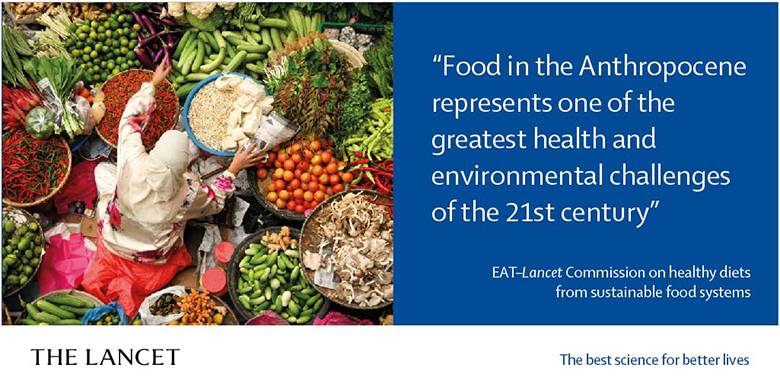
The global, 100+ person team convening for this landmark research was led by Professor Christopher Murray of the Institute for Health Metrics Evaluation at the University of Washington in Seattle, funded by the Gates Foundation. Appropriate that Prof. Murray is a “metrics” guru, because this report generated very impactful insights into the role of diet in health across the world. The context for this study is that suboptimal diet is a key risk factor for noncommunicable diseases — which are the conditions that are killing most people on Earth these days (as opposed to infectious disease, once the world’s primary cause of mortality). The study looked into the food intake among people in 195 countries and their health outcomes (mortality and morbibidity).
In 2017, the most recent year of the research, 11 million people died due to dietary risk factors: notably due to high sodium intake, low use of whole grains, and low intake of fruits and vegetables. These results are shown in the bar chart here.
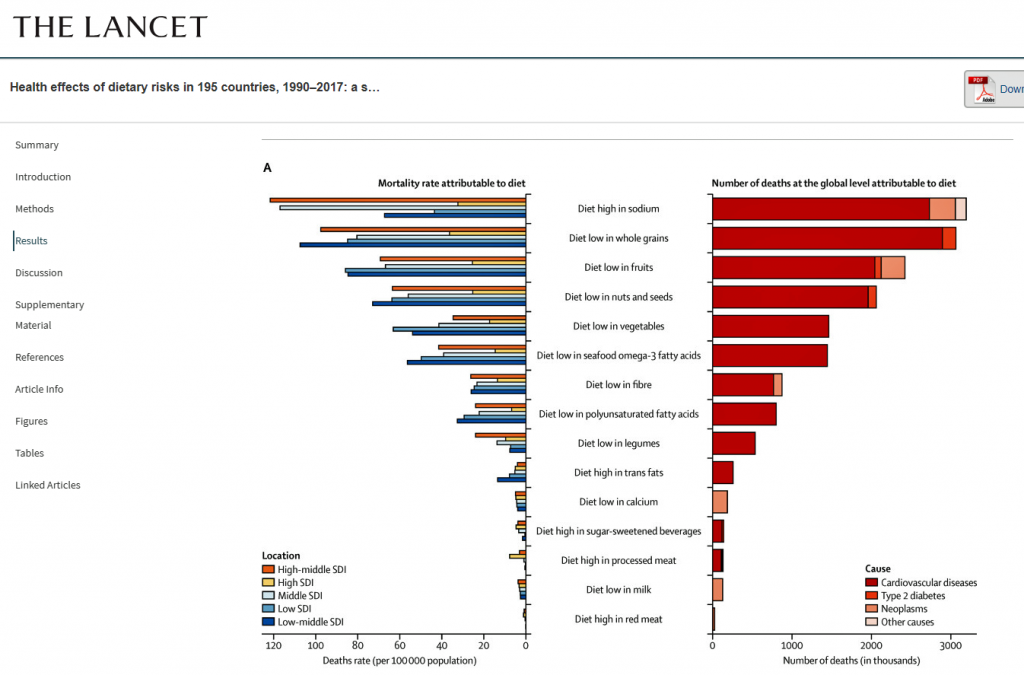
From food it’s a clear connection to climate change. I connected those dots here on Health Populi in this post on climate’s impact on the global syndemic of agriculture, undernutrition and, ultimately, metabolic disease.
In addition to the food supply impact for the Planet Earth’s patients, climate change impacts public health in many other ways. The American Public Health Association founded the Center for Climate. Health and Equity with funding from the Kresge Foundation to support public health professionals’ work on climate change and health.
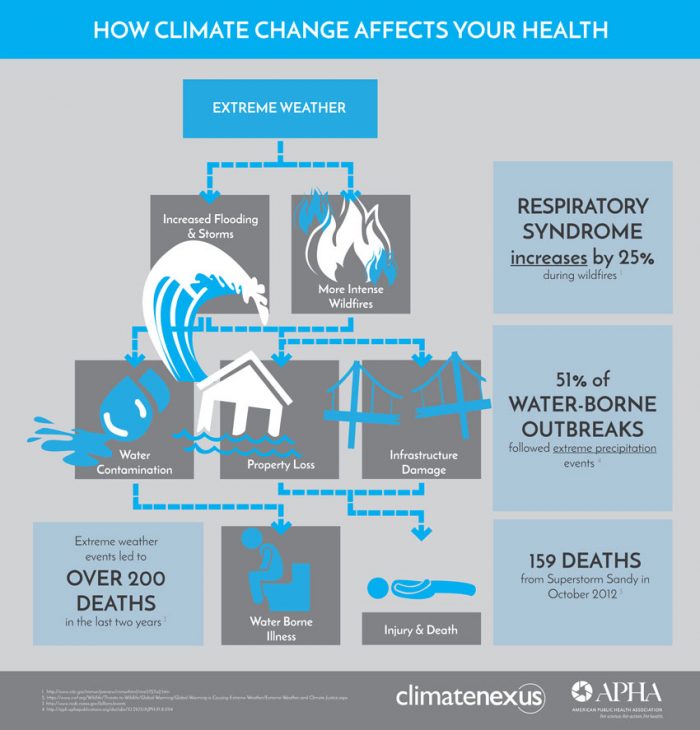
As the graphic illustrates, extreme weather trends have risks for water and fire incidents, which put peoples’ health at-risk for respiratory conditions, water-borne illnesses, and deaths, along with property loss and financial devastation that also compromise the health of individuals and communities.
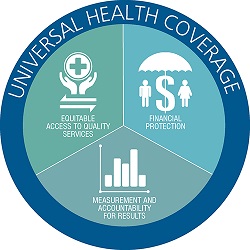 The WHO’s focus on this year’s 2019 World Health Day is universal health coverage (UHC). WHO’s work with the world’s health citizens the world over informs their view that universal health coverage is the assurance that people can access essential health services: women giving birth attended by a skilled clinician or birthing coach; children receiving vaccinations in full and on schedule; and, patients getting timely and modern treatments for HIV, malaria, and TB.
The WHO’s focus on this year’s 2019 World Health Day is universal health coverage (UHC). WHO’s work with the world’s health citizens the world over informs their view that universal health coverage is the assurance that people can access essential health services: women giving birth attended by a skilled clinician or birthing coach; children receiving vaccinations in full and on schedule; and, patients getting timely and modern treatments for HIV, malaria, and TB.
The circle diagram illustrates WHO’s view on the three fundamental pillars of UHC: equitable access to quality health services, financial protection, and measuring and ensuring accountability.
Here’s a video from the World Health Organization explaining their lens on World Health Day 2019 –
Health Populi’s Hot Points: This year, WHO’s target is equity and solidarity, “raising the bar for health for everyone, everywhere by addressing gaps in services, and leaving no one behind,” the Organization explains in their campaign.
A fourth SDOH I’ve been advocating for the past decade is peoples’ access to digital health tools that can scale care to the person, that N of 1, wherever s/he lives. Rural and urban dwellers, alike, often cannot afford data plans charged by Internet Service Providers. When people cannot buy data plans, they can’t access the online world to seek jobs, connect with others to alleviate social isolation, learn skills, or access health care or personal health information.
The Digital Society Index 2019, a report from Dentsu Aegis, points out that access to digital infrastructure is a necessary condition to engage in the digital economy — which is, in 2019, a basic human need. This is just true for people living in developing countries; this is also true in the U.S., where too many health citizens still lack access to reliable broadband connectivity whether due to the “last mile” problem lacking infrastructure, or the “last dollar” problem of affordability.
Health for all – everyone, everywhere — sounds like a very American ideal and deal, alike.
To add to your World Health Day 2019 foodie goodness, here’s my go-to food-tech experts at Food Tank’s list of their ten favorite “plant-forward” cookbooks to boost your own health and wellness. There are classics on here like my old reliable friend the Moosewood Cookbook from Molly Katzen’s inspiring (and delicious) kitchen in Ithaca, NY, and the inspirational Jose Andres’s new classic, Vegetables Unleashed, published this year.


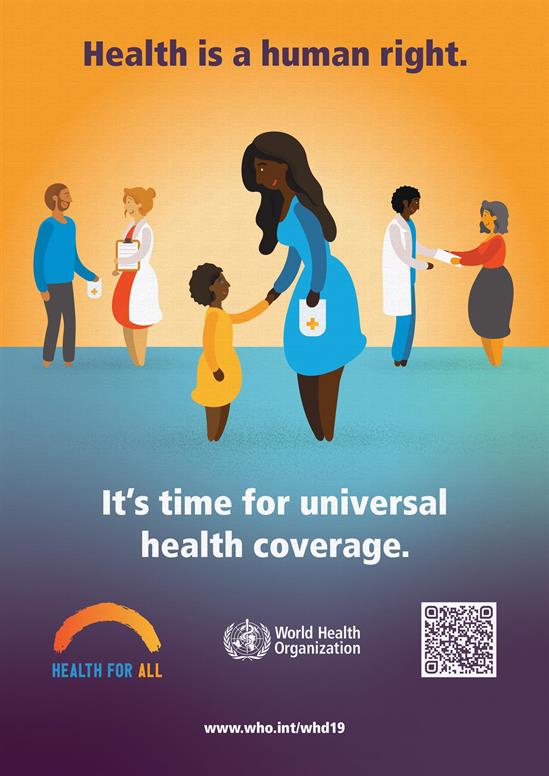


 Thanks to Feedspot for naming this blog, Health Populi, as a
Thanks to Feedspot for naming this blog, Health Populi, as a